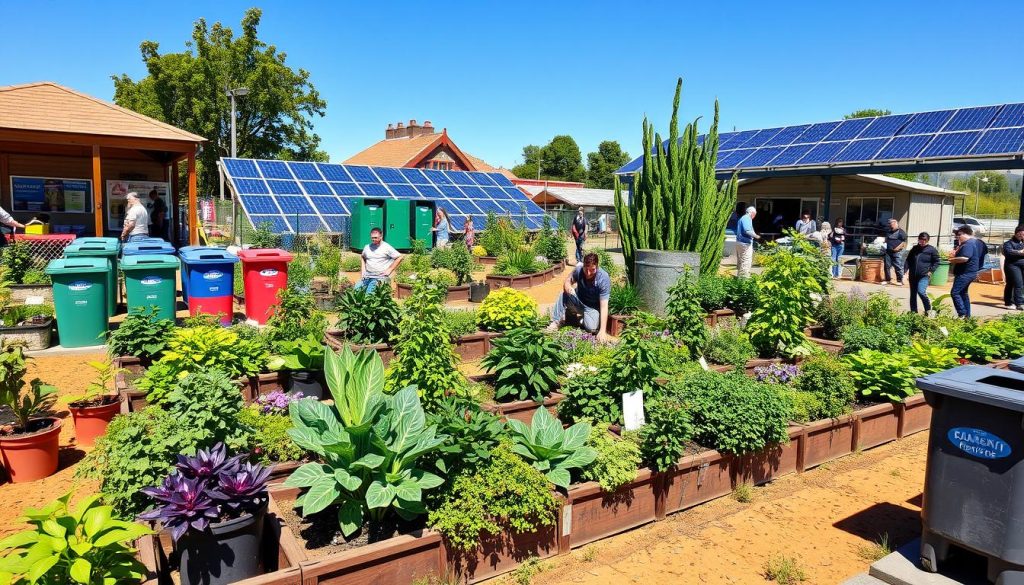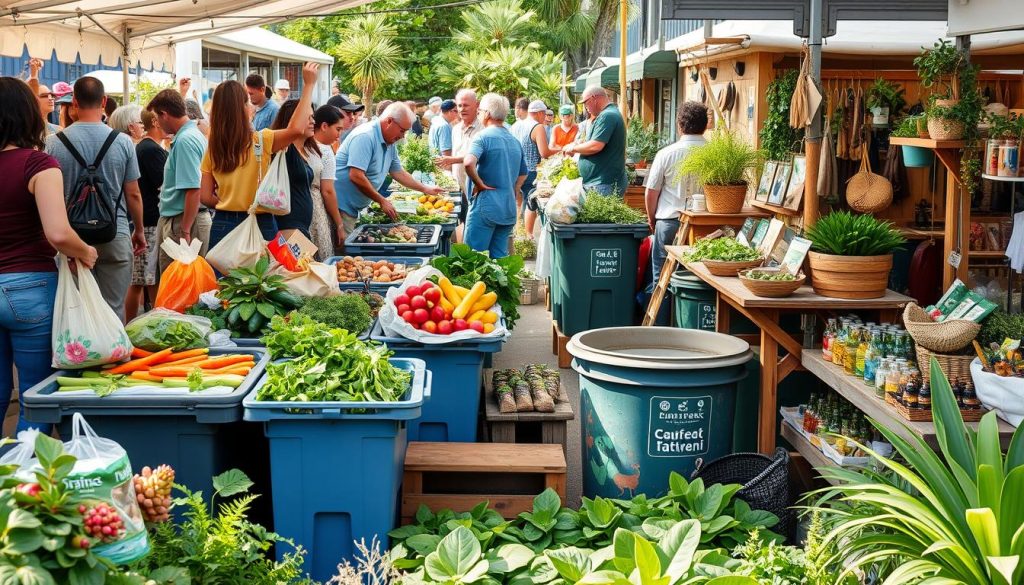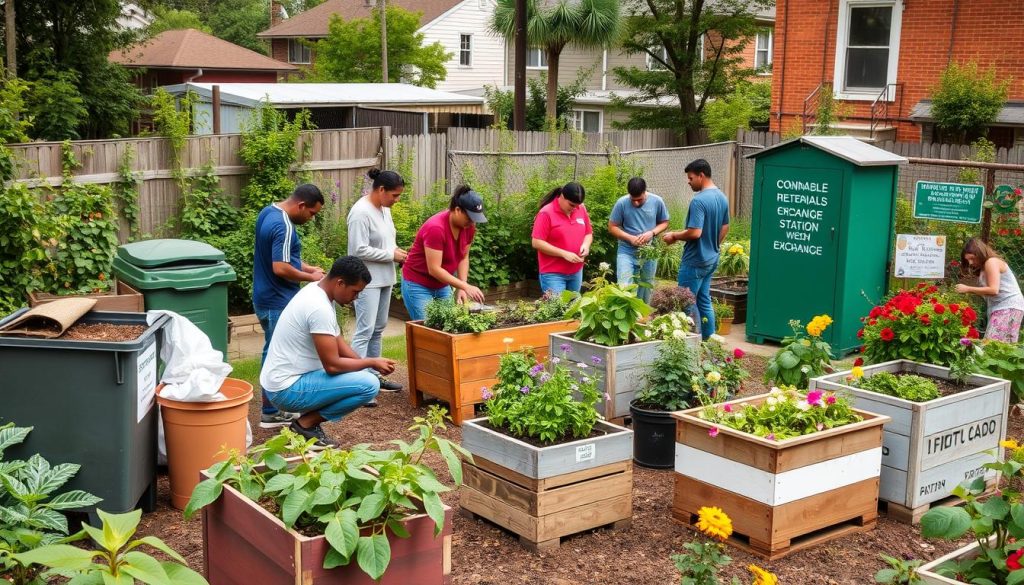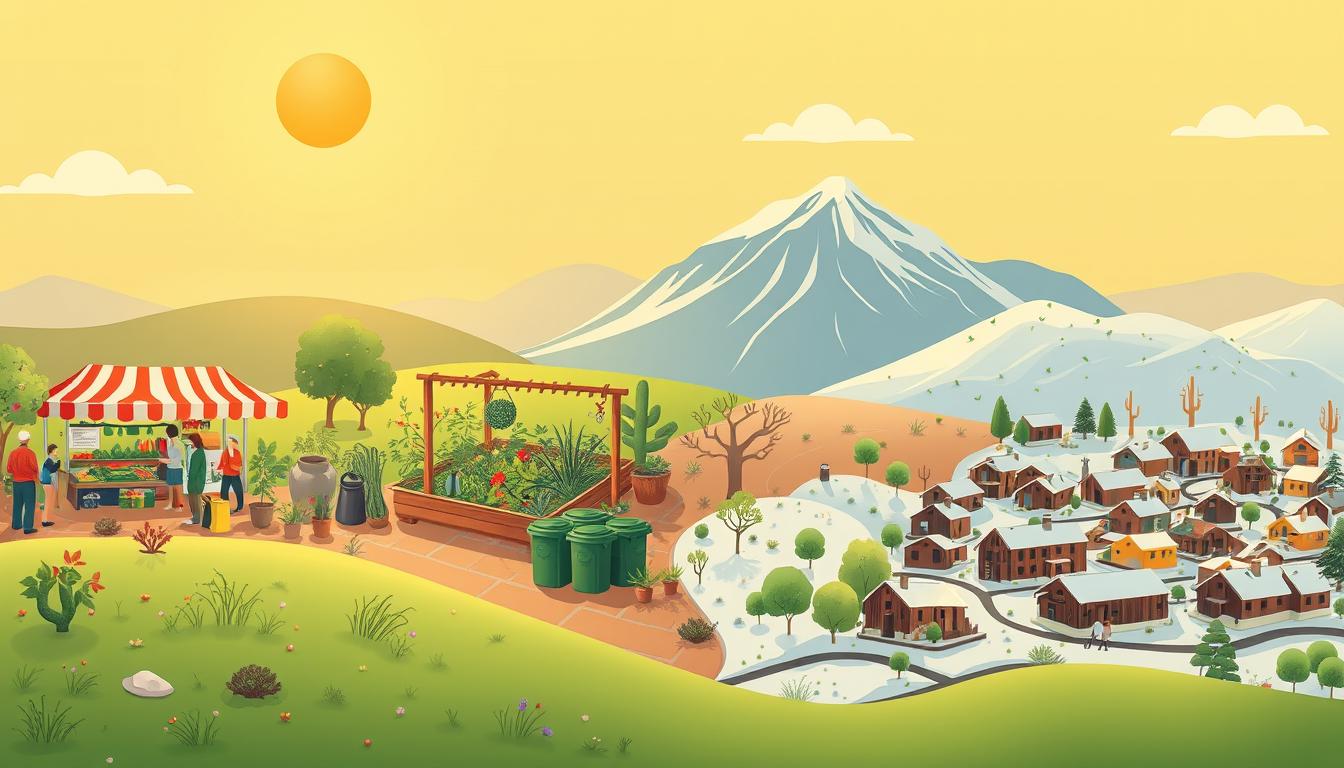I’ve always been interested in zero waste and how it can change our waste management. But, I’ve learned that zero waste can’t be the same everywhere. This guide will help you adapt zero waste to your local climate.
We’ll cover the basics of zero waste and clear up common myths. We’ll also look at how climate affects waste. With this info, you can find the best strategies for your area. This guide is for everyone, no matter where you live, to help you live zero waste.
Understanding Zero Waste Principles
Zero waste is a big deal for a greener future. It’s about using resources wisely and cutting down on waste. This idea is not just for the planet but also for our local communities and climates.
The Importance of a Zero Waste Lifestyle
Today, living zero waste is key. Our planet is facing big issues like climate change and running out of resources. By using zero waste, we can help the environment and make a better future for all.
Key Components of Zero Waste
Zero waste is all about less, reuse, and recycling. It makes us think differently about our daily habits. This way, we can help create a world where resources keep flowing.
Common Misconceptions About Zero Waste
- Zero waste doesn’t mean no waste at all. It’s about making waste as small as possible and keeping the rest out of landfills.
- It’s not just about recycling. Zero waste includes reducing, reusing, and changing how we consume things.
- Zero waste fits each community differently. It’s about finding strategies that work for where we live and our climate.
By getting zero waste, we can all help make a better future. It’s about using smart waste management for our local needs.
Evaluating Your Local Climate for Waste Reduction

Understanding your area’s unique factors is key for community-based zero-waste initiatives and locally-tailored zero-waste programs. Knowing the climate-responsive waste minimization opportunities and challenges helps you create a better waste reduction plan.
Factors Influencing Waste Generation
The local climate greatly affects how much and what kind of waste is generated. Temperature, precipitation, and seasonal changes play big roles. For instance, hot and humid climates might see more food waste. Cold areas might have more packaging and heating waste.
Types of Waste Common in Different Climates
- Warm and humid climates: Increased food waste, yard waste, and disposable items
- Cold and snowy climates: Higher levels of packaging, heating materials, and winter-related waste
- Arid and drought-prone areas: Reduced organic waste, but potential increase in water-saving products and single-use alternatives
Assessing Community Resources for Recycling
It’s important to know what recycling and composting services are available in your area. Look at what materials they accept, how often they collect, and any rules that might limit your waste reduction efforts.
By looking at waste generation factors and local resources, you can make a climate-responsive waste minimization plan. This plan will be tailored to your community’s needs, making your zero-waste journey more sustainable and effective.
Practical Tips for Zero Waste in My Area

Adapting zero waste to your local climate can greatly help your sustainability efforts. Here are some tips to reduce waste and live a zero waste lifestyle that fits your area.
Grocery Shopping with Zero Waste in Mind
When you go grocery shopping, try to cut down on packaging waste. Use reusable bags, containers, and produce bags to avoid single-use plastics. Also, shop at local farmers markets or co-ops that promote reusable packaging.
Composting in Varied Climates
Composting is crucial for adapting zero waste to your local climate. Find composting methods that fit your weather. In hot, dry areas, use a closed bin to keep moisture in. In cooler places, an open-air pile might work better.
DIY Alternatives to Conventional Products
Try making your own household products to reduce waste. Make cleaning supplies, personal care items, and more using simple methods. This cuts down on packaging and lets you tailor products to your local climate and needs.
Community Involvement and Support

Reaching zero waste goals is a team effort. It needs the help of our local communities. By working together, we can make a bigger difference. Regionalized and community-based initiatives are key to lasting change.
Building a Zero Waste Network
First, find people and groups in your area who care about zero waste. Go to local green events, join online groups, or contact community centers. This way, you can share ideas, resources, and support each other.
Local Workshops and Resources
Look for zero waste workshops and classes in your area. They can teach you skills like composting or making eco-friendly items. Many places offer these for free or low cost. Use these chances to learn more and meet your neighbors.
Collaborating with Businesses for Sustainability
Talk to local businesses about being more eco-friendly. Help them start zero waste programs, like reusable containers. This way, we can all help the environment and support our local economy.
Zero waste is a team effort. By connecting, sharing, and working with businesses, we can build a better future for our neighborhoods.
Keeping My Zero Waste Journey Sustainable
Living a zero waste life is a journey that never ends. It needs you to be flexible and always ready to learn. By tracking your progress, you can find ways to do better and adjust to your local climate changes. Being open to change is essential for keeping your zero waste habits going strong.
Tracking My Progress
It’s important to keep an eye on how much waste you’re reducing. I log my waste every month, breaking it down by type and noting any changes. This helps me see patterns and find ways to improve my waste-free living.
Adjusting Strategies Based on Climate Changes
As the seasons change, so must your zero waste plans. I pay close attention to the weather and local environment. This way, I can adjust my composting, shopping, and product choices to stay effective.
Celebrating Small Wins Along the Way
It’s vital to celebrate every small victory. Whether it’s less trash or finding a new zero waste product, I always acknowledge these achievements. Seeing my progress keeps me motivated and excited to keep exploring new ways to live zero waste.

